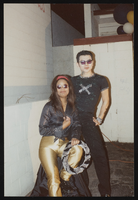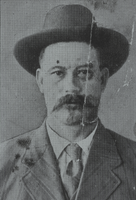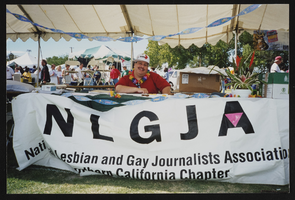Search the Special Collections and Archives Portal
Search Results
Albert (Bert) Hood oral history interview
Identifier
Abstract
Oral history interview with Albert Hood conducted by Dennis McBride on June 16, 1998 for the Las Vegas Gay Archives Oral History Project. In this interview Bert Hood discusses his early life, getting married to a woman, joining the army, discovering his sexuality, and the various loves of his life. He also talks about coming to Las Vegas, Nevada in 1962, working at the Sands Hotel as a bartender, serving The Rat Pack, who tipped him generously, cruising at Squires Park, local gay landmarks, and the first drag shows in Las Vegas.
Archival Collection
Rodney Sumpter oral history interview
Identifier
Abstract
Oral history interview with Rodney Sumpter conducted by Dennis McBride on August 30, 1999 for the Las Vegas Gay, Lesbian, Bisexual and Transgender Archives Oral History Project. In this interview, Sumpter discusses his involvement with repealing one of Nevada’s sodomy laws (NRS 201.190) in 1985. He recalls going to the Nevada State Supreme Court and discusses similar cases involving sodomy laws in the United States.
Archival Collection
Kevin M. Kelly oral history interviews
Identifier
Abstract
Oral history interviews with Kevin M. Kelly conducted by Dennis McBride on September 08 and 22; and November 10, 2000 for the Las Vegas Gay Archives Oral History Project. In the interviews, Kelly talks about his family and early life in Boston, Massachusetts with a focus on his Catholic upbringing. He recalls his law education, serving in the United States Army during the Vietnam War for eleven years, and discovering his sexuality in 1966 while working in the Boston City Hospital. Kelly then describes being discharged from the military due to allegations of being gay, and his family's reaction. He then recalls moving to Las Vegas, Nevada in 1978, where he was involved in a robbery and shooting incident with a male sex worker in 1982. Kelly goes on to recall the trial that proceed the incident and how it publicly outed him. He details how he was charged with felony sodomy and ultimately lost his job as a result of the trial. Finally, he talks about serving on a task force to investigate bias in Nevada's court system in 1992 and being honored in 1994 by the Gay and Lesbian Community Center of Southern Nevada for his work.
Archival Collection

Pride Street dancers at the Gay and Lesbian Community Services Center in Las Vegas, Nevada: photographic print
Date
Archival Collection
Description
Image
Sally MacEachern oral history interviews
Identifier
Abstract
Oral history interviews with Sally MacEachern conducted by Dennis McBride on February 24 and March 11, 2002 for the Las Vegas Gay, Lesbian, Bisexual and Transgender Archives Oral History Project. MacEachern opens her interview discussing her birth and upbringing with her twin sister in Wisconsin during the 1940s. She then describes her family history, her life as a twin, and what it was like to be part of a military family. MacEachern then talks about her first lesbian sexual encounters and meeting other lesbians for the first time. She discusses joining the military and efforts within the organization to remove lesbians from the service that eventually lead to her termination. MacEachern then recalls going to college in the 1960s, meeting other lesbians, and moving in with her first girlfriend. She describes moving to Las Vegas, Nevada for graduate school, joining the gay community, and frequenting local gay businesses including Maxine's and Camp David. She then discusses the lesbian separatists movement, the different struggles gay men face compared to lesbian women, and the local community response to the AIDS crisis.
Archival Collection

Slide of Sheriff Sam Gay, Las Vegas, circa 1906-1920s
Date
Archival Collection
Description
Image
It's a Gay, Gay World, 2004
Level of Description
Archival Collection
Collection Name: Guide to the Canadian Film Centre Worldwide Short Film Festival Submissions
Box/Folder: Box 2004-035
Archival Component

Mike Spadoni at the National Lesbian and Gay Journalists Association booth at Gay Pride: photographic print
Date
Archival Collection
Description
Image
Mark Douglas oral history interview
Identifier
Abstract
Oral history interview with Mark Douglas conducted by Dennis McBride on May 16, 1999 for the Las Vegas Gay, Lesbian, Bisexual, and Transgender (LGBT) Archives Oral History Project. In this interview, Douglas discusses his family and upbringing in the Mormon Church, his realization of his sexuality, first experiences with gay clubs and associations, and the conflict between his feelings and his faith. He continues talking about Church views of homosexuality in a modern and historical context and then details two organizations that offer support to LGBT members of the Mormon Church.
Archival Collection
